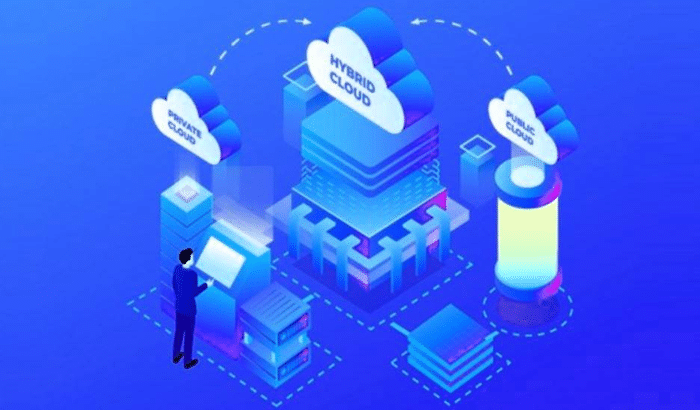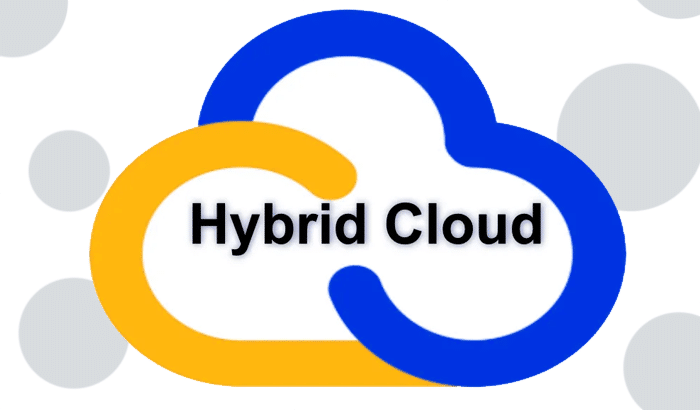In today’s digital age, businesses are constantly seeking innovative solutions to enhance their operations and stay ahead of the competition. One such solution that has gained significant popularity is hybrid cloud technology.
The benefits of hybrid cloud for businesses are manifold, offering a flexible, scalable, and secure infrastructure that combines the best of both worlds – public and private clouds. In this article, we will delve into the various advantages that hybrid cloud brings to the table and how it can revolutionize your business operations.
Daftar Isi :
What is Hybrid Cloud?
Before we dive into the benefits, let’s understand what hybrid cloud entails. Hybrid cloud refers to a computing environment that combines the use of both public and private clouds. It allows businesses to leverage the advantages of both cloud models, tailoring their infrastructure to suit their specific needs. With hybrid cloud, organizations can seamlessly integrate on-premises infrastructure with public cloud services, creating a hybrid IT environment that offers greater flexibility, scalability, and control.
The Benefits of Hybrid Cloud You Need to Know for Business

1 Scalability and Flexibility
One of the key advantages of hybrid cloud is its scalability and flexibility. Businesses often experience fluctuations in demand, and with hybrid cloud, they can easily scale their resources up or down based on their requirements. This elasticity allows organizations to handle peak workloads efficiently without investing in additional on-premises infrastructure. By leveraging the public cloud during peak periods, businesses can ensure optimal performance and customer satisfaction, all while optimizing costs.
2 Cost-Effectiveness
Cost-effectiveness is a crucial consideration for any business. Hybrid cloud offers a cost-efficient solution by allowing organizations to leverage the benefits of public cloud services while retaining critical applications and data on private infrastructure. With hybrid cloud, businesses can optimize their IT spending by avoiding unnecessary hardware investments and only paying for the resources they consume in the public cloud. This flexibility enables cost savings without compromising performance or security.
3 Enhanced Security and Data Protection
Security is a top priority for businesses, especially when it comes to sensitive data and applications. Hybrid cloud provides an enhanced level of security by allowing organizations to keep their most critical data and applications on-premises while leveraging the advanced security features provided by reputable public cloud providers. This approach ensures that sensitive information remains under the organization’s control, reducing the risk of data breaches and unauthorized access.
4 Improved Performance and Reliability
With hybrid cloud, businesses can achieve improved performance and reliability by strategically distributing their workloads. Critical applications and data can be kept on-premises to minimize latency and ensure fast response times, while non-sensitive workloads can be offloaded to the public cloud, benefiting from its extensive infrastructure and global reach. This distribution of workloads enhances overall performance, reduces downtime, and improves the end-user experience.
5 Simplified Disaster Recovery
Disaster recovery is a critical aspect of business continuity planning. Hybrid cloud simplifies disaster recovery by providing organizations with the ability to replicate their data and applications across multiple locations. By leveraging the public cloud as a backup or secondary site, businesses can ensure that their data remains safe and accessible even in the event of a physical infrastructure failure or natural disaster. This redundancy minimizes downtime and enables quick recovery, mitigating the impact on business operations.
6 Seamless Integration
Hybrid cloud facilitates seamless integration between on-premises infrastructure and public cloud services. Businesses can leverage the hybrid cloud model to connect their existing systems and applications with cloud-based services, enabling data sharing, cross-platform functionality, and process automation. This integration streamlines operations, enhances productivity, and paves the way for digital transformation initiatives.
7 Regulatory Compliance
Compliance with industry regulations and data protection laws is a critical requirement for businesses operating in various sectors. Hybrid cloud offers the flexibility to meet regulatory compliance by allowing organizations to store sensitive data on their private infrastructure while leveraging the compliance certifications and security controls offered by reputable public cloud providers. This approach ensures that businesses can meet their compliance obligations without compromising data security or facing regulatory penalties.
8 Increased Collaboration and Productivity
Collaboration and productivity are essential for business growth and innovation. Hybrid cloud enables seamless collaboration by providing employees with secure access to applications, data, and resources regardless of their location. By leveraging cloud-based collaboration tools and virtual desktop infrastructure, businesses can empower their workforce to collaborate effectively, enhance productivity, and drive innovation across the organization.
9 Competitive Advantage
Adopting hybrid cloud can provide a competitive advantage to businesses. By leveraging the agility, scalability, and innovative capabilities offered by hybrid cloud technology, organizations can accelerate time-to-market for new products and services, respond quickly to changing market demands, and stay ahead of the competition. The ability to scale resources rapidly and leverage cutting-edge technologies positions businesses for success in the digital era.
10 Future-Proofing Your Business
In a rapidly evolving technological landscape, future-proofing your business is crucial. Hybrid cloud offers a future-proof solution by enabling organizations to adapt and evolve their IT infrastructure as technologies and business needs change. By embracing hybrid cloud, businesses can stay agile, embrace emerging technologies, and ensure they are well-equipped to meet future challenges and opportunities head-on.
11 Hybrid Cloud Use Cases
Hybrid cloud has found applications across various industries and business scenarios. Some popular use cases of hybrid cloud include:
- E-commerce companies leveraging the public cloud for scalable web hosting while storing sensitive customer data on private infrastructure.
- Healthcare organizations securely storing patient data on-premises while utilizing cloud-based analytics and collaboration tools.
- Financial institutions achieving regulatory compliance by keeping critical financial data on private infrastructure while utilizing cloud-based disaster recovery solutions.
- These examples demonstrate the versatility and value of hybrid cloud in addressing specific business requirements while maximizing the benefits of both public and private cloud models.
Best Hybrid Cloud Computing Solutions in 2023
1. Amazon Web Services (AWS)
AWS is a leading provider of hybrid cloud solutions, offering a comprehensive range of services and features to seamlessly integrate on-premises infrastructure with cloud resources. With AWS, businesses can leverage their extensive network of data centers, storage options, and advanced networking capabilities to build a robust hybrid cloud environment.
2. Microsoft Azure
Microsoft Azure is another prominent hybrid cloud provider that offers a wide array of services for hybrid deployments. Azure provides tools and technologies to connect on-premises infrastructure with the cloud, enabling businesses to leverage their existing investments while benefiting from Azure’s scalability, data analytics, and AI capabilities.
3. Google Cloud
Google Cloud Platform (GCP) is gaining momentum as a hybrid cloud solution, offering a variety of services to facilitate hybrid deployments. With tools like Anthos, businesses can build and manage hybrid architectures, spanning on-premises infrastructure and Google Cloud, while also taking advantage of Google’s advanced data management and machine learning services.
4. IBM Cloud
IBM Cloud provides a robust hybrid cloud platform that enables businesses to integrate their on-premises systems with IBM’s cloud infrastructure. With offerings like IBM Cloud Pak for Integration and IBM Cloud Satellite, organizations can achieve a seamless and secure hybrid cloud environment, combining the benefits of public and private clouds.
5. VMware Cloud on AWS
VMware Cloud on AWS combines the power of VMware’s virtualization technology with the scalability and global reach of AWS. This hybrid cloud solution allows businesses to extend their on-premises VMware environment to AWS, providing a consistent infrastructure and operational model across both environments.
Each of these hybrid cloud providers offers unique features and capabilities to support hybrid cloud deployments. Factors such as integration options, scalability, security, pricing, and compatibility with existing infrastructure should be considered when choosing the best hybrid cloud solution for your organization. It is essential to evaluate your specific needs and requirements to determine the most suitable provider that aligns with your business objectives.
Frequently Asked Questions (FAQs)
FAQ 1: What is hybrid cloud computing?
Hybrid cloud computing refers to a computing environment that combines the use of both public and private clouds. It allows businesses to leverage the benefits of both cloud models, tailoring their infrastructure to meet their specific needs.
FAQ 2: How does hybrid cloud differ from public and private clouds?
While public clouds are fully hosted and managed by cloud service providers and private clouds are dedicated infrastructure owned and managed by individual organizations, hybrid cloud combines the advantages of both. It allows businesses to retain control over critical data and applications on their private infrastructure while leveraging the scalability and cost-efficiency of the public cloud.
FAQ 3: Is hybrid cloud secure?
Yes, hybrid cloud can be secure when implemented correctly. By adopting best practices in data encryption, access control, and network security, businesses can ensure the security of their hybrid cloud environment. It’s important to choose reputable cloud service providers and implement robust security measures to protect sensitive data.
FAQ 4: Can I customize my hybrid cloud environment?
Yes, one of the benefits of hybrid cloud is its flexibility and customization options. Businesses can tailor their hybrid cloud environment to meet their specific requirements, choosing which workloads and data reside on-premises and which utilize public cloud services.
FAQ 5: How does hybrid cloud benefit small businesses?
Hybrid cloud can offer significant benefits to small businesses. It enables them to access enterprise-grade infrastructure and services without the high upfront costs associated with building and maintaining their own data centers. It also provides scalability and flexibility, allowing small businesses to adapt to changing demands and optimize costs.
FAQ 6: What are the potential challenges of adopting hybrid cloud?
While hybrid cloud offers numerous advantages, there can be challenges in its adoption. Integrating on-premises infrastructure with public cloud services requires careful planning and execution. Data transfer, security, and compatibility issues may arise during the migration process. It’s crucial for businesses to work with experienced cloud consultants and ensure proper training and support for their IT teams.
Conclusion
The benefits of hybrid cloud for businesses are undeniable. From scalability and cost-effectiveness to enhanced security and data protection, the advantages of adopting a hybrid cloud environment are vast. By leveraging the strengths of both public and private clouds, organizations can achieve greater flexibility, improve performance, streamline operations, and gain a competitive edge in the digital landscape. As technology continues to evolve, hybrid cloud remains a powerful solution for businesses looking to optimize their IT infrastructure, future-proof their operations, and drive innovation.
Read Also:
- What is KVM VPS? Definition, Benefits, and Drawbacks – Exploring the World of Virtualization
- Difference Between Web Hosting, VPS, and Cloud Server/Virtual Data Center: Choosing the Right Hosting Solution
- 20 Best Document Management Systems for Better Workflow
- Top 10 Best Warehouse Management Software in 2023
- Top 10 Best Knowledge Management Systems

